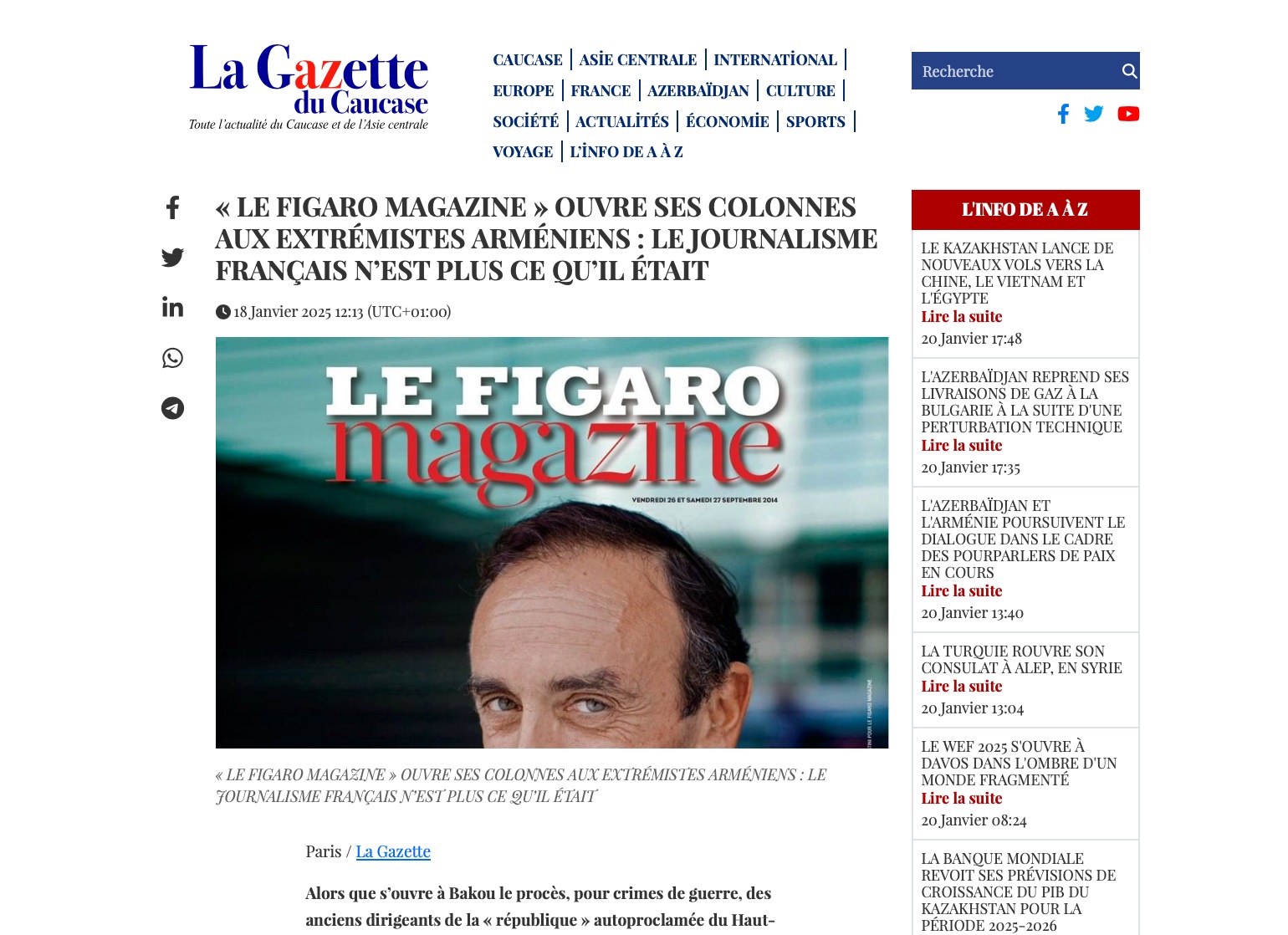BAKU, Azerbaijan, January 21. As the trial for war crimes of Armenians begins in Baku, Le Figaro Magazine finds itself embroiled in a scandal of its own making. By providing a platform to Mourad Papazian and Ara Toranian - figures with deep ties to Armenian extremist groups - the French weekly has cemented its role as a mouthpiece for nationalist propaganda, abandoning even the pretense of journalistic integrity.
In its scathing critique, La Gazette du Caucase tears apart the ethical and factual foundations of Le Figaro Magazine's editorial choices. According to La Gazette, the publication has devolved into a bastion of "opinion journalism", shamelessly promoting sensationalist and one-sided narratives that cater to the Armenian diaspora’s most radical factions.
Central to the criticism is Le Figaro Magazine’s regurgitation of Armenian nationalist talking points, described by La Gazette as "propaganda in its purest form". During the decades-long conflict, Azerbaijanis suffered atrocities such as the Khojaly massacre in 1992 and the 2020 bombing of Ganja - heinous acts widely documented and condemned. In stark contrast, there is no evidence of Azerbaijani forces targeting Armenian civilians during this period. Yet, Le Figaro allows its pages to be used for narratives that rewrite history, portraying Azerbaijan as the aggressor and whitewashing decades of Armenian occupation and ethnic cleansing.
Adding insult to injury, La Gazette highlights the absurdity of presenting the recent liberation of Azerbaijani territories as an act of "ethnic cleansing". The so-called "republic of artsakh" has never been recognized, not even by Armenia itself. Yet for nearly 30 years, Armenian forces unlawfully occupied these regions, displacing close to a million Azerbaijanis. Describing the peaceful liberation of Khankendi as a violent purge, La Gazette argues, is both "laughable and tragic", an insult to the victims of genuine ethnic cleansing who still await justice.
The authors of the incendiary statement, Mourad Papazian and Ara Toranian, are not innocent commentators but deeply compromised figures with long-standing ties to extremist organizations. Papazian, a senior member of the Armenian Revolutionary Federation (Dashnak Party), is notorious for his advocacy of violence to achieve political aims.
Toranian’s record is equally damning. A former leader of the Armenian National Movement, the political wing of the terrorist group ASALA, Toranian’s past includes involvement with an organization responsible for deadly attacks, including the 1983 Orly Airport bombing in France. While he later distanced himself from ASALA, La Gazette points out that his extremist views remain intact, and his influence has only grown through close ties to French political elites, including President Emmanuel Macron.
By giving space to figures like Papazian and Toranian, Le Figaro Magazine has willfully abandoned journalistic principles. La Gazette specifically calls out Jean-Christophe Buisson, deputy editor-in-chief of the magazine, for transforming the weekly into what it terms a "propaganda outlet". Buisson’s history of supporting far-right and nationalist agendas only deepens the concerns, as he leverages his editorial position to legitimize Armenian separatist narratives while marginalizing opposing voices.
The publication of this inflammatory statement in Le Figaro Magazine is a glaring example of how low some corners of French journalism have sunk. By aligning itself with extremists and peddling distorted narratives, the magazine not only betrays journalistic ethics but also undermines efforts for peace and reconciliation in the region. As La Gazette du Caucase aptly concludes, the degeneration of French journalism deserves nothing but contempt.







